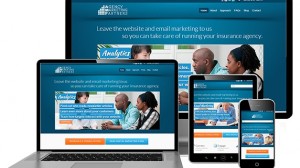Marketing
 Responsive website design refers to designing a website that presents itself in the best possible way for the device it’s being viewed on. The SIS website uses responsive design, so if you’re using a desktop computer try changing the width of this window from stretching all the way across your screen to shrinking it as small as it will go. As you change the size of the window, you’ll see parts of the site rearrange themselves. That is responsive website design.
Responsive website design refers to designing a website that presents itself in the best possible way for the device it’s being viewed on. The SIS website uses responsive design, so if you’re using a desktop computer try changing the width of this window from stretching all the way across your screen to shrinking it as small as it will go. As you change the size of the window, you’ll see parts of the site rearrange themselves. That is responsive website design.
Why Responsive Design
More people today are using mobile devices like phones and tablets to access websites than ever before. You never know how someone may access your site, so you want to prepare for all possibilities.
Traditional sites can cause a few problems when viewed on a smaller screen like on a phone.
- The text can appear very small. The size of your font and the length of your lines of text might look nice when they appear on a computer monitor, but they could be unreadably small on a phone screen. A responsive website will resize the text and change the line breaks to keep everything readable.
- Traditional menus can be difficult to use on a phone. Typical website menus that require you to hover your mouse over one item on the menu to see the other menu-items that are “below” it in the menu-order sometimes don’t even work on a phone. Instead, responsive websites usually entirely change the menu to function as a drop-down list, making it much easier to navigate on a small screen.
- Many site layouts are designed for wide screens, not vertically aligned phone screens. Your computer screen is probably horizontally aligned. That means if your site were designed only for your computer monitor it would probably have multiple vertical elements (like sidebars). When the width of your screen is only three inches across, though, it can be difficult to make sense of what you’re looking at. A responsive site will take sidebars and move them from the side of the screen to below the other content when viewed on a phone.
How to Use Responsive Website Design
Taking advantage of the benefits of responsive website design is surprisingly simple. Many of the common website-building tools (like WordPress, Joomla, and Drupal) include templates and tools to help you build a responsive website. If you are working with a marketing partner to build your site, ask them about responsive website design, and make sure your site will be responsive.
Marketing
 Your website is complicated mix of technology and marketing. It’s an intersection of many of your agency’s services, helping you gain new customers and keep the ones you have. Because of the important role of your website, it’s important that you invest in it and make sure it is up-to-date. You need to consider the different roles your site plays to make the right investments in it.
Your website is complicated mix of technology and marketing. It’s an intersection of many of your agency’s services, helping you gain new customers and keep the ones you have. Because of the important role of your website, it’s important that you invest in it and make sure it is up-to-date. You need to consider the different roles your site plays to make the right investments in it.
Digital Storefront
You know to make sure your storefront or office looks nice because potential and current customers will consider your storefront to reflect the kind of business you run. No matter how simple it is, your storefront is an expression of your brand.
Think of your website as your “digital storefront.” It will form important first impressions for potential customers, and your current customers will see it as a reflection of the service you offer. You want to make sure your website – from how fast it loads to what it looks like – reflects the business you run. It should match the brand you want to convey and provide functionality to help you gain new customers and keep the ones you have.
Inbound Lead Generation
Your website should be built in a way that helps it earn new business for you. There are two components to building a site that will do this for you: an effective search engine optimization (SEO) strategy and the ability to collect website visitor information via website forms.
Improving your SEO will cause you to be found more for searches on Google and other search engines. The best SEO strategies are built into websites from the ground-up, beginning with when the website is first being conceived. Your SEO strategy should target specific local searches in your area. For instance, if you’re in Columbus, Ohio, you’ll want to specifically target searches like “auto insurance in Columbus.”
Once you get prospects on your site, you want to make sure they contact you to buy insurance or learn more about your services. Your site should include effective calls to action (like “Request a quote”) with website forms that allow prospects to easily contact you.
Self-Service
If your site doesn’t include self-service functionality yet, you should begin thinking about if this kind of functionality would be a good fit for your business. “Self-service” refers to the ability for customers to take care of some services on your site without needing to take up your time or the time of those in your office.
You might want to think about allowing customers to print off auto-ID cards, for instance. There are other self-service capabilities your customers may be interested, too. If you talk to them you’re likely to find more. Allowing your customers to take care of these services automatically through your site frees up the people in your office to take on more important tasks.
Your website is a hub of activity for your agency. It’s important to keep it up-to-date to help you gain new customers and keep your current customers impressed with your service.
Marketing, Technology Trends
 Staying ahead in a wired world is not as challenging as you think. Setting up a Google+ business account is simple to do and a lot of fun as well! If you are interested in getting started today, click here. Google+ will walk you through the steps necessary to set up your account. You are also given access to tutorials on how to use the various features. Some helpful hints to remember are:
Staying ahead in a wired world is not as challenging as you think. Setting up a Google+ business account is simple to do and a lot of fun as well! If you are interested in getting started today, click here. Google+ will walk you through the steps necessary to set up your account. You are also given access to tutorials on how to use the various features. Some helpful hints to remember are:
- If you do not have a Google account, you will need to set one up before you get started with Google+. You can sign up for a Google account by clicking here.
- Set up your Google profile, which includes a bio, contact information, and links where other companies or individuals have mentioned you. Make sure to review the visibility settings and set them according to preference.
- Once both steps 1 and 2 are complete, you’re ready to set up your Google+ account. Remember that Google states that Google+ is “the new way to communicate across the Google network.” Have some graphics and a few blog topics ready to post if you want to start your Google+ account off with a bang!
Below are a few examples of Google+ business accounts from the insurance industry. We hope to see you on Google+ soon!
This post is part of a series on Insurance Marketing Strategies brought to you by SIS. At SIS we view it as our job to make all the behind the scenes tasks that go into running an independent insurance agency simpler, so you can focus on growing your book of business.
We do this by doing what we do best – listening to our clients’ needs, constantly working to build a better agency management system, providing outstanding ongoing customer support and looking for the next “best way” we can help you out.
If you are interested in learning more about SIS or our Partner XE agency management system please give us a call at 800-747-9273 or fill out a short contact form and one of our representatives will be in touch soon.
Marketing
 Recently, Steve Anderson wrote a follow-up to Stop Whining: Embrace Google+ titled Another Reason to Embrace Google+ . In this article, Anderson points out that most insurance agencies are local businesses, and local businesses need to advertise locally; hence the need for local listings. “As a local business, you want to be found and do business with people who live and work within a small radius of your physical office location.”
Recently, Steve Anderson wrote a follow-up to Stop Whining: Embrace Google+ titled Another Reason to Embrace Google+ . In this article, Anderson points out that most insurance agencies are local businesses, and local businesses need to advertise locally; hence the need for local listings. “As a local business, you want to be found and do business with people who live and work within a small radius of your physical office location.”
Anderson states that 43 percent of search queries with Google are local and 74 percent of these local searches are done using mobile devices such as cellular phones and tablets. Now that Google+ has replaced the old “Places” in their search engine with “Google+ Local”, businesses should merge their Google+ Local listing with the agency Google+ Business page.
In his article, Anderson also mentions some additional benefits to creating a presence on Google+. The benefits mentioned include:
- Improved Search Results
- Expanded Visuals
- Direct Interaction with Customers
- Assigning Multiple People to your Google+ Local Page
- Multiple Pages for Multiple Locations
- Friend Recommendations
Summing up the article, Anderson suggests your next steps to creating a Google+ account or how to optimize your Google+ Business page if one has already been created. He reminds readers that if they already have a “Google Places” listing, they already have a “Google+ Local” page as well. Linking the Google+ Local page with a Google+ Business page is the next step in establishing a strong internet presence.
This post is part of a series on Insurance Marketing Strategies brought to you by SIS. At SIS we view it as our job to make all the behind the scenes tasks that go into running an independent insurance agency simpler, so you can focus on growing your book of business.
We do this by doing what we do best – listening to our clients’ needs, constantly working to build a better agency management system, providing outstanding ongoing customer support and looking for the next “best way” we can help you out.
If you are interested in learning more about SIS or our Partner XE agency management system please give us a call at 800-747-9273 or fill out a short contact form and one of our representatives will be in touch soon.
Marketing, Technology Trends
 Stop Whining: Embrace Google+ was recently published by the Executive Editor of The Steve Anderson Report (TAAR) Steve Anderson. In this article, Anderson explains that though you may currently be using Facebook for your personal lines and LinkedIn for your business lines, you are more apt to make a stronger digital marketing presence if you embrace Google+ as well.
Stop Whining: Embrace Google+ was recently published by the Executive Editor of The Steve Anderson Report (TAAR) Steve Anderson. In this article, Anderson explains that though you may currently be using Facebook for your personal lines and LinkedIn for your business lines, you are more apt to make a stronger digital marketing presence if you embrace Google+ as well.
Anderson explains that though you may be using Facebook and LinkedIn, to master your internet presence you must use Google+ in some capacity. As mentioned in Part I of this article, Google+ currently hosts more than 500 million users worldwide. Also, according to Business Insider, Google+ is adding 750,000 users everyday. Image the digital marketing opportunities you would have with a daily user increase such as that!
Anderson wraps up the article by providing readers with helpful step and links on how to get started with setting up a Google+ account. Here are some of the suggestions that he makes:
- Fill out your profile in its entirety. This will provide you with a better chance of showing up when someone is searching for information that you may be able to provide.
- Link your website to increase your internet presence. Since information added to Google+ is used by Google in the search results, this is one of the main benefits of a Google+ account. To learn more about doing this step click here.
- Start using circles to organize contacts and connections. Some circles included are topics, industries, family, and friends.
- Post information on Google+ similar to what you would post on Facebook or LinkedIn. You can even post the same information on all three sites.
- Add interesting people to your circles by sharing each other’s posts with links to the original author embedded. Anderson suggests posting comments under the posts to engage with the network and bring new and interesting people to your attention.
- Finally, explore the newer addition to Google+, Communities. These are similar to groups on Facebook and LinkedIn.
This post is part of a series on Insurance Marketing Strategies brought to you by SIS. At SIS we view it as our job to make all the behind the scenes tasks that go into running an independent insurance agency simpler, so you can focus on growing your book of business.
We do this by doing what we do best – listening to our clients’ needs, constantly working to build a better agency management system, providing outstanding ongoing customer support and looking for the next “best way” we can help you out.
If you are interested in learning more about SIS or our Partner XE agency management system please give us a call at 800-747-9273 or fill out a short contact form and one of our representatives will be in touch soon.
 Responsive website design refers to designing a website that presents itself in the best possible way for the device it’s being viewed on. The SIS website uses responsive design, so if you’re using a desktop computer try changing the width of this window from stretching all the way across your screen to shrinking it as small as it will go. As you change the size of the window, you’ll see parts of the site rearrange themselves. That is responsive website design.
Responsive website design refers to designing a website that presents itself in the best possible way for the device it’s being viewed on. The SIS website uses responsive design, so if you’re using a desktop computer try changing the width of this window from stretching all the way across your screen to shrinking it as small as it will go. As you change the size of the window, you’ll see parts of the site rearrange themselves. That is responsive website design.
 Your website is complicated mix of technology and marketing. It’s an intersection of many of your agency’s services, helping you gain new customers and keep the ones you have. Because of the important role of your website, it’s important that you invest in it and make sure it is up-to-date. You need to consider the different roles your site plays to make the right investments in it.
Your website is complicated mix of technology and marketing. It’s an intersection of many of your agency’s services, helping you gain new customers and keep the ones you have. Because of the important role of your website, it’s important that you invest in it and make sure it is up-to-date. You need to consider the different roles your site plays to make the right investments in it.
